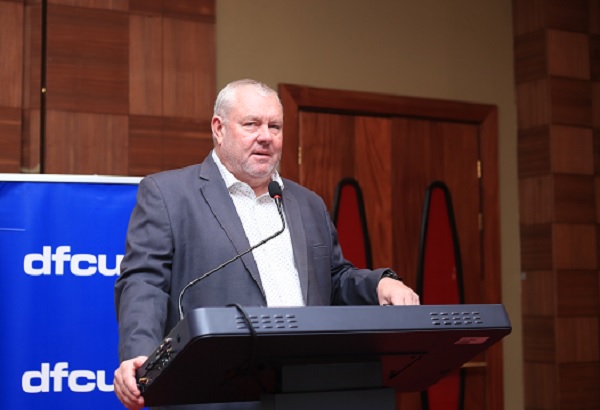
The prize and perils for the next occupant of the hottest seat in Uganda’s private independent media sector
COMMENT | JOSEPH WERE | Monitor Publications Ltd is again managing director hunting after Tony Glencross announced he was leaving after eight years in the hot seat.
Watching the coming and going of bosses at The Monitor is always anticipatory because the position offers an opportunity to provide situational leadership to the independent media industry in Uganda. It is also exciting to see the selection process of The Monitor’s parent company, Nation Media Group, at play because of its rigour and aspiration to best HR practice.
The current search comes at a time of deep soul-searching by a rudderless, failing, and floundering media sector. Glencross is leaving Monitor Publications at a moment of declining profitability and uncertainty. It is a systemic problem for print, digital, and broadcast. The Monitor’s biggest competition; the New Vision Printing and Publishing Company has also put shareholders on notice to expect losses and cited “a challenging business environment”.
Selecting the head of an organisation in such as pivotal position as The Monitor in any industry must transcend core competences, attitudes, values, personal ethics and world views. In these challenging times, Ugandan media need an Elon Musk at the helm. A leader who will not merely tinker, tweak, or kludge but be a disruptor or at least a change maker. This is not the time for also-runs. Uganda’s media industry needs someone who will do smart, new, surprising things.
Since its inception in 1992 under founding MD Wafula Oguttu, Monitor has set itself up as an innovation hub. It was the focal point for international independent media networking, pushed liberal ideologies, brought fun, verve, and gusto in coverage of local, grassroots stories and pioneered avant-garde sections on gender and environment before they became mainstream. It also went full-colour and introduced computers in the newsroom first, and lately multimedia applications and convergence.
Context has been important. So Monitor needs an MD with fresh sector wide analysis. One who can chart a fresh new course and buttress their interventions with coherent arguments, concepts, and policies; one who can lay out an action plan for success of The Monitor but recognize that Monitor cannot succeed unless Uganda’s independent media succeeds.
Contextually, the growth of new digital media has spawned challenges afflicting every media business and needing a long learning curve. Challenges include dwindling advertising spend, declining newspaper copy sales, ratcheting competition among online news publishers, social media, and content aggregators for eye-balls, and challenges of monetising the new digital news media. These challenges have created a tough work environment and shrinking pay cheques. The result is flight of talent from the media industry.
Globally, this is a pivotal moment in the digital media monetisation sphere. After early pursuit of strength in consolidation by companies like BuzzFeed, Vice, and Vox Media to counter content aggregators like Google and Facebook, the new thinking now challenges media strategists to find the non-substitutable core for their organisations.
The Monitor MD position is called a hot seat for two reasons; first the occupants must generate solutions to apparently intractable challenges. Secondly, they must navigate a peculiar problem; the politics of The Monitor, both in and outside the organisation as it brandishes its badge of old-style independent journalism at a time when leaders say you are either with us or against us. These two are the reasons why it will be interesting to see who bites the bullet next.
For over two decades, since Wafula Oguttu left in 2004 and NMG; the Kenyan-based regional media conglomerate, came in, the board of directors has appointed MDs with an eye on business rather than media expertise.
The MD going out came in via advertising sales, branched into marketing, circulation, and finally general management. The MD before him, Alex Asiimwe, was advertising manager before being pushed upstairs. The one before Asiimwe, Githahi Githinji had a medical marketing background. Should the MPL board continue hiring from the business school pool? What is the alternative?
Hiring a business-oriented MD drives a linear strategy in a situation demanding an adaptive strategy. The tunnel vision is that, in spite of its lofty exhortations of missionary roots, the media industry is first and foremost, a business that needs merchants to generate value for its shareholders. Smart thinking must recognise that is the “What” the MD should deliver. The challenge is on crafting the “How” the MD delivers the value to shareholders.
It is clear that all recent MDs have known what needs to be done. The challenge that has sent them packing in a huff has been failure to craft a winning route; the how. You could say the destination is known, the challenge is how to get there. You could call that the missing strategy.
Peeling this onion implies successfully crafting definite actions to exploit new technologies to monetise new media. It means tackling ratcheting online competition and declining newspaper copy sales and subscriptions. It also involves pursuing old-style independent journalism in a hostile environment. As already said, these KPIs appear intractable but they shouldn’t be. All that is needed is for the incoming MD to see the opportunity in each risk and devise clear action points to turn each hiccup into a tea cup and every liability into an asset.
The media business is replete with examples of managers who have come into office at challenging times and charted a new path passed the perils to prosperity. William Randolph Hearst Sr. was a 23 year-old lad when he took over management of his father’s newspaper, the ailing San Francisco Examiner in 1887 and within a year had doubled its circulation with his credo of “get results”. In the process, he and his arch-competitor, Joseph Pulitzer mainstreamed yellow, tabloid, or sensational journalism.
Love them or hate them, the duo got results. That is what Monitor Publications and indeed most media publication in Uganda and Africa need. Results.
That requires something amply lacking in Ugandan media corner offices; creativity. Many MDs come in expecting running a media house to be something akin to running an advertising agency. Many refuse to feed the goose; the media content generating resources, which lays the golden egg.
That is why the Monitor now needs an MD who recognises that good journalism is good business that pays. It needs an MD who recognises the right order of the five core elements that matter in the new media world; mission, content generation, public interest, subscriptions, and business.
*****
 Jospeh Were is Managing Editor at The Independent
Jospeh Were is Managing Editor at The Independent
 The Independent Uganda: You get the Truth we Pay the Price
The Independent Uganda: You get the Truth we Pay the Price



